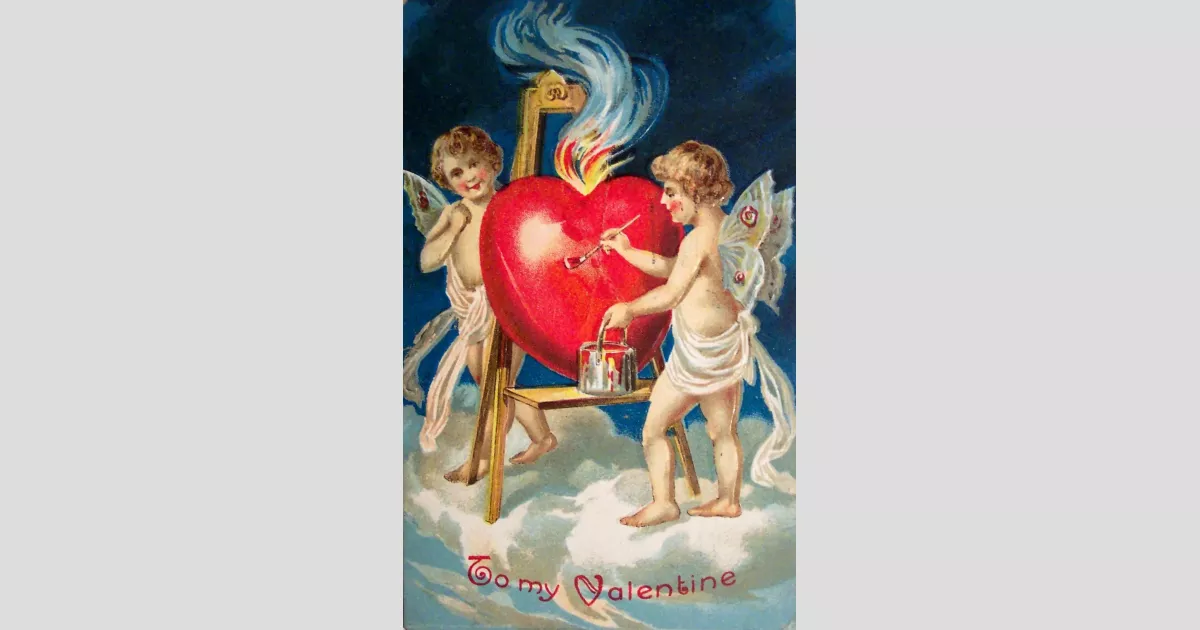Valentine's Day, observed annually on February 14th, began as a Christian feast honoring Saint Valentine. Over time, it evolved through folk traditions into a global cultural, religious, and commercial celebration of romance and love. While rooted in religious origins, it is now widely recognized as a secular holiday characterized by expressions of affection, gift-giving, and romantic gestures.
1904: Death of Esther Howland
Esther Howland, who introduced mass-produced Valentines of embossed paper lace to the United States, died in 1904.
1936: Morozoff Ltd. Introduces Valentine's Day
In 1936, Morozoff Ltd. introduced Valentine's Day in Japan, running an advertisement aimed at foreigners.
1948: Valentine's Day Introduced in Spain
In 1948, Valentine's Day was introduced in Spain through an advertisement campaign by the department store chain Galerías Preciados.
1953: Promotion of Heart-Shaped Chocolates
In 1953, Morozoff Ltd. began promoting the giving of heart-shaped chocolates in Japan; other Japanese confectionery companies followed suit thereafter.
1958: "Valentine sale" at Isetan department store
In 1958, the Isetan department store in Japan ran a "Valentine sale".
1960: General Roman Calendar
In 1960, the feast day was celebrated in Balzan, Malta, where relics of the saint are claimed to be found, and throughout the world by Traditionalist Catholics who follow the older, pre-Second Vatican Council calendar (see General Roman Calendar of 1960).
1992: Valentine's Day Spreads to India
Around 1992, Valentine's Day celebrations started catching on in India, influenced by commercial TV channels like MTV, radio programs, and economic liberalization that boosted the valentine card industry.
1993: First Valentine's Day in Bangladesh
Valentine's Day was first celebrated in Bangladesh in 1993 by Shafik Rehman, a journalist and editor of the newspaper Jaijaidin.
1995: Release of 'Sense and Sensibility' Film Adaptation
In 1995, the film adaptation of Jane Austen's novel 'Sense and Sensibility' was released, starring Hugh Grant as Edward Ferrars and Emma Thompson as Elinor Dashwood. A line from this movie was later voted the most romantic line from literature, film and TV.
1996: Victorian Valentines Book
In 1996, the Laura Seddon Greeting Card Collection at Manchester Metropolitan University gathered 450 Valentine's Day cards dating from early 19th century Britain, printed by the major publishers of the day, which appeared in Seddon's book Victorian Valentines.
2001: Esther Howland Award
Since 2001, the Greeting Card Association has been giving an annual "Esther Howland Award for a Greeting Card Visionary".
2002: Ban on Valentine's Day Items in Saudi Arabia
In 2002, religious police in Saudi Arabia banned the sale of all Valentine's Day items, considered a Christian holiday.
2002: First Public Valentine's Day Celebration in Chełmno, Poland
In 2002, the first public celebration of Valentine's Day in Poland, named "Walentynki Chełmińskie", was held in Chełmno. This event combines local cult traditions with Anglo-Saxon Valentine's Day customs, leveraging Chełmno's relic of Saint Valentine.
2005: Fatwa against Valentine's Day
In 2005, a fatwa (ruling) was issued by Malaysia's top clerics, noting that Valentine's Day "is associated with elements of Christianity."
2008: Further Ban on Valentine's Day Items in Saudi Arabia
In 2008, religious police in Saudi Arabia banned the sale of all Valentine's Day items, considered a Christian holiday.
2009: Valentine's Day Practices Banned in Iran
Since 2009, certain practices associated with Valentine's Day, such as giving flowers, cards, or gifts, have been banned in Iran, with the Law Enforcement Force prosecuting distributors of related goods.
2010: Valentine's Day spending in the US
In 2010, Valentine's day spending was at $108 per person in the US.
February 14, 2011: "Awas Jerat Valentine's Day" Campaign
On February 14, 2011, Jakim officials planned to carry out a nationwide campaign called "Awas Jerat Valentine's Day" ("Mind the Valentine's Day Trap"), aimed at preventing Muslims from celebrating the day on February 14. Activities included conducting raids in hotels to stop young couples from having unlawful sex and distributing leaflets to Muslim university students warning them against the day.
2011: Arrests for Celebrating Valentine's Day
In 2011, West Malaysian religious authorities arrested more than 100 Muslim couples for celebrating Valentine's Day, with some facing charges in the Shariah Court.
2011: Restrictions on Valentine's Day in Iran
Since 2011, authorities in Iran have attempted to discourage celebrations and impose restrictions on the sale and production of Valentine's Day-related goods, although the holiday remains popular.
February 2012: Warning Against Public Displays of Affection
In February 2012, Subash Chouhan of the Bajrang Dal warned couples in India against public displays of affection on Valentine's Day, threatening violence.
2012: Arrests for Celebrating Valentine's Day in Saudi Arabia
In 2012, the religious police in Saudi Arabia arrested more than 140 Muslims for celebrating Valentine's Day and confiscated all red roses from flower shops.
2015: Valentine's Day spending in the UK
In 2015, around £1.9 billion was spent in the UK on cards, flowers, chocolates and other gifts for Valentine's Day.
2016: Efforts to revive the Persian festival of Sepandārmazgān largely unsuccessful
As of 2016, efforts to revive the ancient Persian festival of Sepandārmazgān to replace Valentine's Day were largely unsuccessful.
2016: Most Romantic Line Chosen by Channel 4 Poll
In 2016, a Channel 4 poll voted Jane Austen's line, "My heart is, and always will be, yours", from her novel Sense and Sensibility, as spoken by Edward Ferrars (Hugh Grant) to Elinor Dashwood (Emma Thompson) in the 1995 film adaptation, as the most romantic line from literature, film, and TV.
2016: Valentine's Day Present Buying Survey in Sweden
In 2016, a survey in Sweden revealed that less than 50% of men and women were planning to buy presents for their partners on Valentinsdag.
2016: Novena Prayer Established
In 2016, the Catholic Bishops of England and Wales established a novena prayer "to support single people seeking a spouse ahead of St Valentine's Day."
2016: Valentine's Day Banned in Peshwar
In 2016, the local governing body of Peshwar, Pakistan officially banned the celebration of Valentine's Day in the city. The ban was also implemented in other cities such as Kohat by the local governments.
2017: Attempt to rebrand Valentine's Day
In 2017, authorities had advanced the idea to rebrand Valentine's Day as "Cow Hug Day", but the move seems to have failed and later retracted after it prompted a rush of internet memes, cartoons and jokes by TV hosts about the importance of consent.
2017: Valentine's Day Banned in Pakistan
In 2017, the Islamabad High Court banned Valentine's Day celebrations in public places in Pakistan.
2017: No Prevention of Celebrations
In 2017, the religious police in Saudi Arabia did not prevent Muslims from celebrating Valentine's Day.
2017: Valentine's Day Spending
In 2017, total expenditure for Valentine's Day topped $18.2 billion, or over $136 per person. Purchases include jewellery, flowers, chocolates, candy, and greeting cards. Roses, especially red roses, are the most popular flower.
2018: Valentine's Day remains popular in Iran
As of 2018, Valentine's Day remained popular in Iran, despite the authorities' attempts to discourage the celebrations.
2018: Cleric deems Valentine's Day compatible with Islamic Values
In 2018, Sheikh Ahmed Qasim Al-Ghamdi, a Saudi cleric, said that Valentine's Day is not haram and is compatible with Islamic values.
2018: Survey Finds Valentine's Day Unpopular in India
In 2018, an online survey found that 68% of respondents in India did not wish to celebrate Valentine's Day, with different religious groups expressing their disapproval.
2018: Media Restrictions on Valentine's Day in Pakistan
In 2018, the Pakistan Electronic Media Regulatory Authority advised broadcasters and newspapers against airing any Valentine's Day celebrations.
2019: Survey on Valentine's Day
In 2019, a survey by the National Retail Federation found that over the previous decade, the percentage of people who celebrate Valentine's Day had declined steadily.
2021: Prosecutor's Office of Qom Prosecutes Anti-Cultural Symbols of Valentine's Day
In 2021, the Prosecutor's Office of Qom, Iran, announced it would prosecute those who disseminate and provide anti-cultural symbols associated with Valentine's Day.
February 2023: "Cow Hug Day" Appeal
In February 2023, the Animal Welfare Board of India appealed to Indians to celebrate February 14 as "Cow Hug Day" for "emotional richness" and to increase "individual and collective happiness."
Mentioned in this timeline
Saudi Arabia officially the Kingdom of Saudi Arabia KSA is...
India officially the Republic of India is a South Asian...
Japan is an East Asian island country located in the...
Pakistan officially the Islamic Republic of Pakistan is a South...

Books are a means of storing information as text or...
Spain officially the Kingdom of Spain is located in Southern...
Trending

48 minutes ago Tom Steyer's California plan faces criticism while he spends millions on governor's race.

48 minutes ago Darius Garland Prepares for Clippers Debut Against Warriors After Trade

48 minutes ago Mark Stoops Hired by Texas as Special Assistant to Steve Sarkisian

49 minutes ago Tyus Jones Joins Denver Nuggets: Bolstering Depth Before Jazz Game.

3 days ago Katie Boulter faces Jasmine Paolini in WTA Merida Quarterfinals; Hon Prediction

49 minutes ago Rubio: US attacked Iran preemptively due to Israeli plans; six service members killed.
Popular

Jesse Jackson is an American civil rights activist politician and...

Hillary Diane Rodham Clinton is a prominent American politician lawyer...

Jim Carrey is a Canadian-American actor and comedian celebrated for...

XXXTentacion born Jahseh Dwayne Ricardo Onfroy was a controversial yet...

Kashyap Pramod Patel is an American lawyer who became the...

Barack Obama the th U S President - was the...

